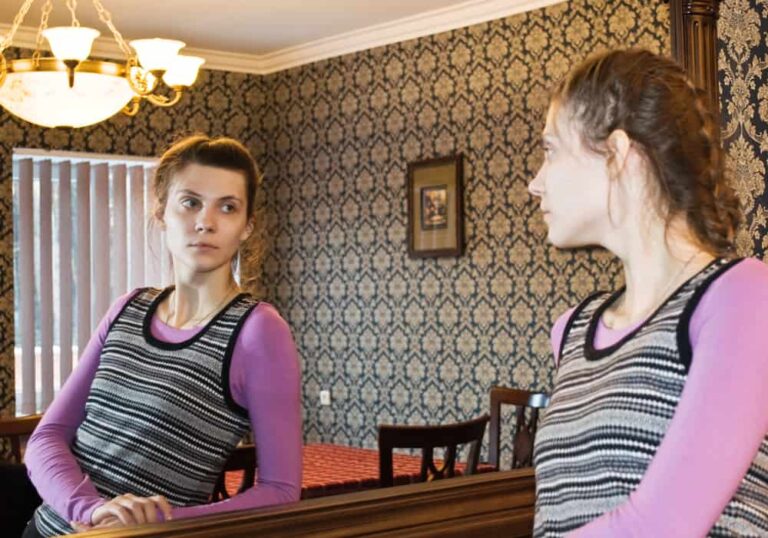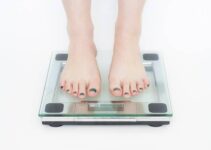As adults, we all know that we can become consumed with thoughts about how our bodies compare to others. Now, with the constant stream of comparisons via social media, it can be even harder to steer ourselves away from having opinions about our bodies and how they measure up to those we see around us.
Body image struggles are not just for adults. Children also struggle with negative thoughts about how they look that could contribute to severe mental and physical difficulties later in life, if not addressed.
Children begin to develop their self-concept of their bodies at a very young age, largely based on the messages they receive from the media, as well as the friends and adults around them.
If they receive the message that there is an “ideal” body type and that the main goal of life is to achieve it, children and teens can begin to develop unhealthy thoughts that can lead to dangerous attempts to mold themselves into someone they aren’t.
Research shows that children as young as three years old can articulate having negative thoughts or feelings about the way their bodies look.[1]
At around the age of three, children begin to develop awareness of themselves as their own person and can begin to compare themselves and the way they look to others.
As a result, children begin to notice differences between them and those around them naturally at this time and may begin to form opinions about things that they like about themselves and things they like about others.
While this is a typical part of development, statistics continue to show that even very young children have negative thoughts or feelings about the image of their bodies.
Research on eating disorders and body image have found that a shocking 42 percent of girls studied in grades 1-3 have reported wanting to lose weight, and that 45 percent of both genders in grades 3-6 reported wanting to be thinner.[2]
This shows that the messaging sold to children by commercials, television shows, and other mediums impacts kids and they’re beginning to look at themselves more critically than adults may assume they ever could.
Developing a healthy self-concept about body image is a difficult road — it is typical for children (especially as they go through adolescence) to be self-conscious and compare themselves to others more than they should.
While having awkward years where a child or teen does not feel confident in their body is a typical childhood experience, some children develop severe maladaptive thought processes during this period where they begin to distort their sense of self completely, causing them to engage in unhealthy and often dangerous behaviors to try to feel better about themselves.
It is important for parents to be able to assess and talk to their children about healthy body image, and also to see and address the red flags that indicate that their child has more atypical struggles.
Let’s take a look at what is considered “normal” in terms of body image and what would be considered the warning signs that you may need to get your child some help from a professional.
Table of Contents
What’s Typical and What’s Not?
Beginning to compare and contrast themselves to others is a typical milestone of child development.
It is important for parents to help children and teens acknowledge the differences they have from those around them and to normalize them in a way that helps to accept differences for what they are and not attach any negative feelings to them.
Here are some typical markers that your child or teen has a healthy body image:
Typical Body Image in Children 3-12
- Children will begin to discuss differences between themselves and others.
- Children might discuss things that they like about the way others look (and sometimes what they dislike, as well).
- Children often make statements indicating that they wish they had physical attributes like those around them.
- Children may begin to make negative statements about parts of their body and the way those parts look.
- Children may say things like, “I’m fat,” or, “I don’t like my nose,” often as a result of hearing this voiced aloud by those around them. These are generally things that can be redirected, as long as they aren’t constant.
- While children may have some negative thoughts, they should also be able to identify their positive qualities.
- Children will not become fixated on negative thoughts about themselves and won’t spend a significant amount of time talking about, noticing, or discussing their body and how they look.
**Note: While these are considered typical patterns of behavior in children, using the tips in the “How Can I Help My Child?” section below can help to improve their body image.
Body Image Concerns That May Require Professional Assistance in Children Ages 3-12
While it is typical for children to begin to think critically about how they look and how their bodies make them feel, if a child is spending significant time thinking about, talking about, or worrying about their appearance, they may need to speak with a professional who can help alleviate some of the ruminating thoughts surrounding their imperfections.
Here is a list of things that may indicate that your child could benefit from some assistance with managing their negative body image:
- They struggle to see the positives and strictly discuss negative aspects of their body and appearance. If they consistently say things like, “I am ugly,” or, “I hate my (insert body part here),” or if they get a compliment and they immediately retract it and identify negative thoughts about how they look, this may indicate struggles with a healthy body image.
- They begin to refuse to eat previously desired foods or restrict their eating at meals.
- They begin to place value judgements on types of food, calling foods “good” or “bad.”
- They talk about dieting or wanting to eat less food to be “thinner.”
- They are hyper-focused on body changes in those around them. Weight fluctuation of peers, parents, and others may be of particular interest to children who are beginning to develop negative self-concepts around their own bodies.
- They begin to struggle with choosing clothing and engage in arguments with parents, indicating that they don’t “look good” in their clothing.
**Note: If you are noticing or experiencing these symptoms with your child, it is recommended that you seek assistance from a mental health professional to help improve their ability to cope with their struggles with eating habits.
Typical Body Image in Teens (12-18)
Like children, teens also spend time comparing themselves to others, sometimes more so than both children and adults do. Theorists have long studied adolescents and determined that they begin to experience a typical confusion related to how they fit in their social network and the world around them.
This happens because they are beginning to develop their own sense of self, and they do this by trying on different identities via clothing, hobbies, behavior, attitudes, music choices, etc.
Erik Erikson, a psychologist and development theorist, discusses this important part of development in his theory of psychosocial development as an integral time that determines how a person understands themselves and their place in the world.[3]
Here are some typical ways teens may express their self-concept and body image:
- Taking care of their bodies without parental assistance. Teens may begin to develop routines to take care of themselves that involve eating healthy, exercising, and spending more time grooming to improve the way they feel about themselves and their bodies.
- Teens may spend more time fixating on how they look, but it should not interfere with social or educational life. Teens will begin to spend more time grooming, trying on make-up, and changing their look, but should still be able to function in their day-to-day life.
- Teens notice differences between themselves and others but do not place significant negative value judgements on these differences. While they might have moments of insecurity, they are able to identify positives about themselves that outweigh their doubts. Teens will always have something they are struggling with liking about themselves as their bodies change, but healthy teens will be able to identify things they like and appreciate about their bodies, as well.
- They may change their eating habits but are able to continue to eat the right amount of food to keep them nourished and healthy. Teens will often use this time in their lives to begin to try new ways to eat (i.e., vegetarian or veganism, choosing to focus on more whole foods, etc.). As long as teens are not restricting their intake, this is considered a typical part of self-expression and identity formation.
**Note: While these are considered typical patterns of behavior in teens, using the tips in the “How Can I Help My Child?” section below can help to improve their body image.
Body Image Concerns That May Require Professional Assistance in Teens Ages 12-18
A teen’s journey to a solid sense of self can often be filled with insecurity, shame, and many other negative thoughts and feelings about themselves and how they compare to others because the teenage years have the most awkward developmental milestones thanks to puberty.
While this is relatively typical for most teens, some begin to develop significant negative self-concept during this time that can affect the rest of their life and the way they see themselves.
Here is a list of risk factors to look for to determine whether or not your child could use help form a professional to improve their ability to have a positive body image:
- Changes in their sleeping, eating, and exercising habits — Any significant and consistent changes in sleep habits, eating habits (eating way too much or way too little), and exercise habits (exercising too much or too little) can be an indicator that your child is struggling with some kind of mental health concern, and it may be related to poor body image.
- Restricting food or apparent binging on food — Counting calories and severely restricting food or eating way too much food are signs that something is wrong. If your child makes frequent trips to the bathroom during or right after meals, this is another warning sign that something may be wrong.
- Excessive exercise — While daily exercise is indicated for a healthy body, sometimes teens can become fixated on exercise as a way to lose weight or change their bodies. They may begin to spend way too much time working out, will continue to work out in spite of injury, health problems, or decreased attention to their social and educational lives.
- Fixation with appearance, constant checking of themselves in mirrors, asking other people’s opinions about how they look — While it is common for teens to be focused on how they look, a rigid fixation on checking themselves, talking about how they look, and worrying about their appearance is an indicator of something that could lead to more distorted body image issues.
- Avoid looking at themselves in a mirror and engage in consistent self-deprecating statements about how they look — In addition to being fixated on their appearance, it is also common for teens struggling with body image issues to avoid looking at themselves and avoid grooming and other activities that would force them to notice their bodies and how they look.
- Changes in mood, personality, energy levels, interest in desired activities — Any significant shifts in mood, personality, energy, and interest in doing things they like to do can be a sign that a teen is struggling and could use some help.
- Isolating from friends and loved ones — Like many other mental health concerns, if a teen begins to isolate themselves from social events, family events, or begins to distance themselves from the world, it is a sign that they may need to talk to someone to help them determine what is causing the isolation.
- Excessive discussion of food, weight, and body image — Teens who are struggling with body image will often find it hard to discuss anything other than body-image related topics.
- Changes in clothing — Changing one’s look is common for teens, but if they are experiencing struggles with body image, they may work to hide their bodies or struggle to find clothing that they feel comfortable in. A person who is struggling with body image may begin wearing clothing that is loose or too big to cover their bodies and hide it, or may begin to have severe struggles with choosing clothes as a result of feeling like they do not look good enough to wear the clothes they have.
**Note: If you are noticing or experiencing these symptoms with your child, it is recommended that you seek assistance from a mental health professional to help improve their ability to cope with their struggles with eating habits.
What Causes Unhealthy Body Image?
The way society discusses bodies and the way they look has a lasting impact on children and teens and how they perceive their own bodies. There are lots of ways that a child can begin to develop unhealthy body image, even from a very young age and hearing those around them speak negatively about their own bodies can cause them to look more critically at their own.
In addition, the messages from advertising and the media suggest that there is an ideal perfect body type and that we all should strive to reach that unattainable milestone through dieting, weight loss, supplements, and exercise videos, etc.
Sometimes children participate in activities — particularly sports — that have some inherent body image criteria that they have to meet.
Gymnastics and wresting are two examples of sports that have inherent body requirements and stress that children who participate in these activities begin to fixate on how to improve their performance in the sport by changing their body weight and appearance.
Can Other Things Cause Problematic Body Image?
In addition to psychosocial causes, other mental health disorders, like anxiety or depression for example, can also increase a person’s likelihood of developing negative self-concept and body image. Here’s a list of some other things that can contribute to negative body image and may exacerbate some body-related struggles in children and teens:
- Family Dysfunction: In addition to problematic messages about body image and how a person should look, children who live in high-conflict, violent, or stressful homes can experience emotional dysregulation that can cause them to internalize their negative feelings about their family interactions and begin to take these feelings out on themselves by becoming overly critical about the way they look. Sometimes children and teens can feel a sense of control when obsessing over changing their bodies that can distract them from the feelings of hopelessness caused by not being able to control what happens in their family.
- Peer Problems: As teens begin to compare and contrast the way they look based on their peers and what they see in the media, it is common for kids to use their differences to engage in bullying and teasing when someone does not fit into what is considered an ideal body image for their community. Problems with peers in this way can have damaging effects on a child’s mental health and self-confidence, as this critical period of time is when teens feel the most vulnerable.
- Medical Concerns: While this is not super common, medical problems that affect the way a teen looks can impact the way they see their bodies and how they relate to those around them. Any physical indicators of disabilities or physical abnormalities can contribute to a decrease in overall confidence with a teen’s body or self-image as well.
How Can I Help My Child?
There are many ways that parents can help their children develop a healthy and solid sense of self around their body image. First, it is important for parents to understand their own self-image and the way they model their relationship with their own body.
If you spend a considerable amount of time fixating on food restriction, calorie counting, and identifying yourself as fat, your children will pick up on this and begin to emulate it.
In addition to self-awareness, parents should also be aware of the red flags that can arise in children and develop open communication about these things in order to normalize the impulses to be critical about their bodies, and to help them develop healthy ways to understand their bodies to improve their self-concept.
In addition to seeking professional help if they are struggling, here are some concrete parenting strategies to help your child develop solid, healthy body image at home, based on age:
Babies-Young Children
- It’s important to reinforce a child’s inherent pleasure in exploring and appreciating their bodies as babies to help them develop positive body image; cuddling and nurturing them while encouraging them to move and use their bodies is the first step to appreciating their bodies.
- Very early on, teach children about their bodies and how to take care of their bodies to help them develop appropriate body image.
- Discussing their abilities and things they do with their bodies, and less about how they look, will help them understand the purpose of the body and begin to have more positive attributes surrounding the things their body helps them do.
- Encourage kids to be active and healthy, both with food and physical activity.
Teens and Beyond
- Communicate with teens about body changes and normalize them. Explain to them that bodies need to gain some fat to grow, and that muscles take time to develop to help them understand that growth and development is a process to learn to be patient with the awkward moments that arise in puberty.
- Allow kids to explore styles and identities to help them come to terms with who they are. Encourage and express positive things about each of these changes to help them to feel accepted and loved, no matter what they look like. It’s important to note that, while parents should be flexible and allow kids to develop their identities on their own, they should continue to monitor to make sure these identity shifts are not going to inherently make it easier for their children to be exploited or harmed as a result.
- Continue to encourage activity and healthy eating as well as sleeping, but monitor for obsessiveness in these areas.
- Remember to praise teens for their abilities rather than just their looks.
- Spend quality time together to help improve their relationships with you and themselves, as they will feel positively connected to their family and distract from thinking about how they look and compare to others.
- Focus on activities that help them do things and don’t involve their physical appearance as much.
- Help teens begin to develop flexible thinking about food and incorporate mindfulness strategies to help them recognize when they’re hungry, when they’re full, and what their bodies need at given times.
- Have overall healthy communication with teens so they feel comfortable coming to you with concerns and doubts they experience.
What Can I Expect in the Future?
Eating habits really vary in how they manifest and, depending on when and how they are addressed, can be relatively short or life-long, depending on severity. It is important to remember that fluctuations of appetite and eating patterns are a typical part of development and that some things will resolve on their own.
That being said, children and teens who exhibit the above-mentioned red flags and concerns should be assessed so they can get help right away, as early as these patterns start developing.
Early intervention is key in eating-related difficulties and can significantly improve the ability to change the way they think and feel about eating and body image.
If they do not get this help, they may be able to make sense of their eating and self-image concerns on their own, but it may be a long process of trials and tribulations that could lead to unhealthy outcomes first.
What to Expect When Seeking Help
Body image struggles can be very dangerous and concerning if they are not addressed. Children or teens who struggle with atypically negative body image may need help redirecting their thoughts and feelings by a mental health and/or medical professional to help them learn how to cope with their negative self-image and develop a positive sense of self.
Mental health professionals can help children and teens begin to understand what they are thinking and feeling related to their body and appearance and how to manage and overcome the negative thoughts and behaviors that result from feeling uncomfortable with the way they look.
There are many different approaches that are used to help children and teens who experience body image struggles, but the most common approach is utilizing cognitive behavioral therapy (CBT) techniques. CBT is a well-researched approach that helps children understand the thoughts they are having, how these thoughts contribute to how they feel, and how their feelings contribute to their eating behaviors.
This is usually done one-on-one with children to help them fully understand how their thoughts and feelings contribute to their difficulties in managing their eating habits.
Dialectical Behavior Therapy (DBT) is another evidence-based treatment that can help children and teens learn how to tolerate discomfort in their appearance and address it through healthier coping skills.
In addition, professionals often use family therapy treatment to help families understand their role in reinforcing negative patterns and learn how to help their child find a way to improve the way they think and address body image at home.
Sometimes children struggling with various mental health concerns often indicated by poor body image may require a psychiatrist’s support.
A child may be prescribed medication in addition to therapeutic treatment to help them improve their ability to use coping skills presented in treatment, rather than giving in to dangerous and unhealthy behaviors related to changing their body image.
Raising a child who is experiencing significant difficulties related to body image can be worrisome and stressful ,but knowing what to look for can help you act quickly to overcome struggles.
Mental health professionals can help your child and your family begin to understand where some of the negative messaging about body image comes from and how to overcome it so that your child will be able to have a healthy and happy relationship with their body throughout the rest of their life.
References
- Pearson, C., & Pearson, C. (2016, September 01). Some 3-Year-Olds Struggle With Body Image, And That’s Depressing As Hell. Retrieved April 29, 2019
- Founder, B. H., Rutledge, T., Elizabeth, & Johns Hopkins Medical School. (2018, October 16). Statistics | Eating Disorders | Body Image Therapy Center | Maryland. Retrieved April 29, 2019
- Cherry, K. (n.d.). Understanding Erikson’s Stages of Psychosocial Development. Retrieved April 29, 2019









